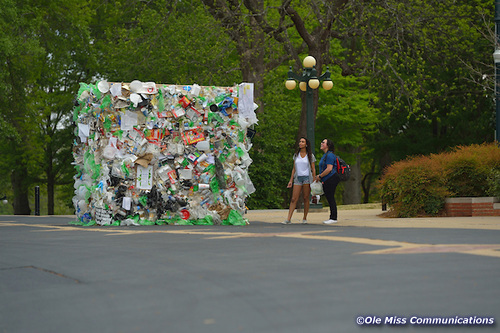Recycling and Waste Reduction

Students view the 2014 Green Week Exhibit, the Consumption Cube. The 8’x8′ sculpture represents how much waste is produced every six hours on campus.
Did you know that our campus generates more than 12 tons of trash each day? This means that about 400 pounds of trash will be landfilled per person on this campus this year, where it won’t begin to decompose for hundreds to thousands of years. The University of Mississippi works to reduce waste through recycling programs, composting and educational efforts to promote source reduction–that is, not creating waste that must be thrown away in the first place.
Highlighted Initiatives
Ole Miss Recycling Program
The University of Mississippi recycles waste through the City of Oxford. On campus, you can recycle mixed paper, aluminum, plastic (#1 and #2), and electronic waste. If you live in city limits, you can sign up with the City of Oxford for curbside pickup of recycling. If you live in Lafayette County, outside of city limits, or in an apartment complex without a pickup option, you can use any of the city’s easy to locate drop-off locations. Please click here to learn more about recycling options here on campus and in Oxford.
Recycling Signage
Recycling signage has been shown to greatly reduce contamination and increase recycling rates. The Office of Sustainability and University Communications have worked together to develop clear and descriptive signage to apply above and on recycling bins in both academic buildings and residence halls. Click here for more information on how to order fathead signs and to directly print off signs for your recycling bins.
Green Grove Gameday Recycling
The Green Grove program facilitates recycling on game day in the Grove and in the Circle. Student volunteers conduct outreach related to recycling and help sort recycling after the game. As a university, we participate in the EPA Gameday Challenge–a recycling competition among colleges and universities. You can help by volunteering, applying for a leadership position within Green Grove, or just by recycling your plastic bottles, aluminum cans and Solo cups on game day. It is just that easy! Learn more here.
UM Compost Program
Why Compost?
More than 40 percent of food in the U.S. is thrown away. So, what’s the problem? In a landfill, layers of trash block the flow of oxygen to decomposing food scraps. This results in the release of methane, a potent gas that traps heat in the atmosphere. Food in a compost pile breaks down naturally, greatly reducing the impact of your breakfast, lunch and dinner.
About the UM Compost Program
Since its establishment in 2013, the UM Compost Program has diverted more than 100,000 lbs of food waste from landfill. The program began as a pilot project that was proposed by a student to the UM Green Fund, and was so successful that it became an initiative of the Office of Sustainability and now composts pre-consumer food waste from seven different campus dining locations. An overview of the data obtained from the compost program over the past years can be found here.
Learn more about the UM Compost Program, including volunteer opportunities and options for purchasing compost, by clicking here.
Hydration Stations
The Office of Sustainability partnered with RebelWell to install H20tty Toddy Hydration Stations (water-refilling stations) across campus, with generous support from BlueCross BlueShield Mississippi. Reducing waste by using reusable items or purposely seeking out packaging that is recyclable is called source reduction. Hydration Stations fulfill an aspect of source reduction by supporting reusable bottle use on campus. Learn more about this project and view a complete list of station locations on the RebelWell website.
Did you know?
The Mississippi Recycling Coalition has recognized the University of Mississippi by naming it the 2018 “Recycler of the Year” among educational institutions in the state. The Office of Sustainability recognizes Facilities Management, Landscape Services, Ole Miss Dining and Oxford Recycling for their collaboration and contribution to this designation. Our office recognizes the value in this distinction, but still sees many areas in recycling and waste management that our university can grow and continue to improve. You play an important role in our success!